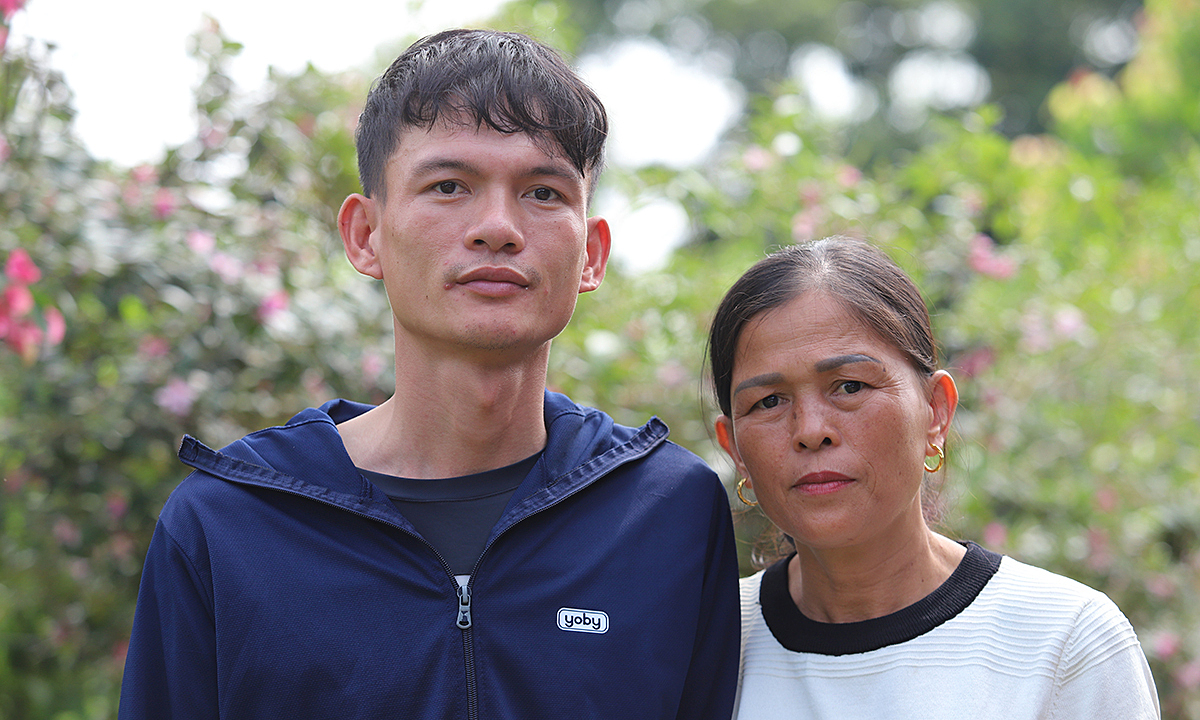
For years, a 98-year-old veteran and a deaf-mute couple in the central province of Ha Tinh have dreamed of a sturdy home, but that dream has yet to be realized.
In Hamlet 3 of Huong Thuy Commune, Huong Khe District, nestled in a narrow alley, stands the crumbling three-room home of Tran Viet Van, 98. Built 24 years ago with the family's savings, the house, made of pine planks and topped with a fiber roofing, is visibly deteriorating. Termites have eaten through the wooden walls, the roof is riddled with holes, and the support beams are severely decayed.
Van, a veteran of the Battle of Dien Bien Phu who also served in Laos and southern Vietnam, shares the house with his wife, Nguyen Thi Tam, who is 100 and bedridden with cognitive decline. The couple relies on their daughter-in-law, Nguyen Thi Hong, who lives 2 kilometers away, for daily help with cooking, cleaning, and personal care.
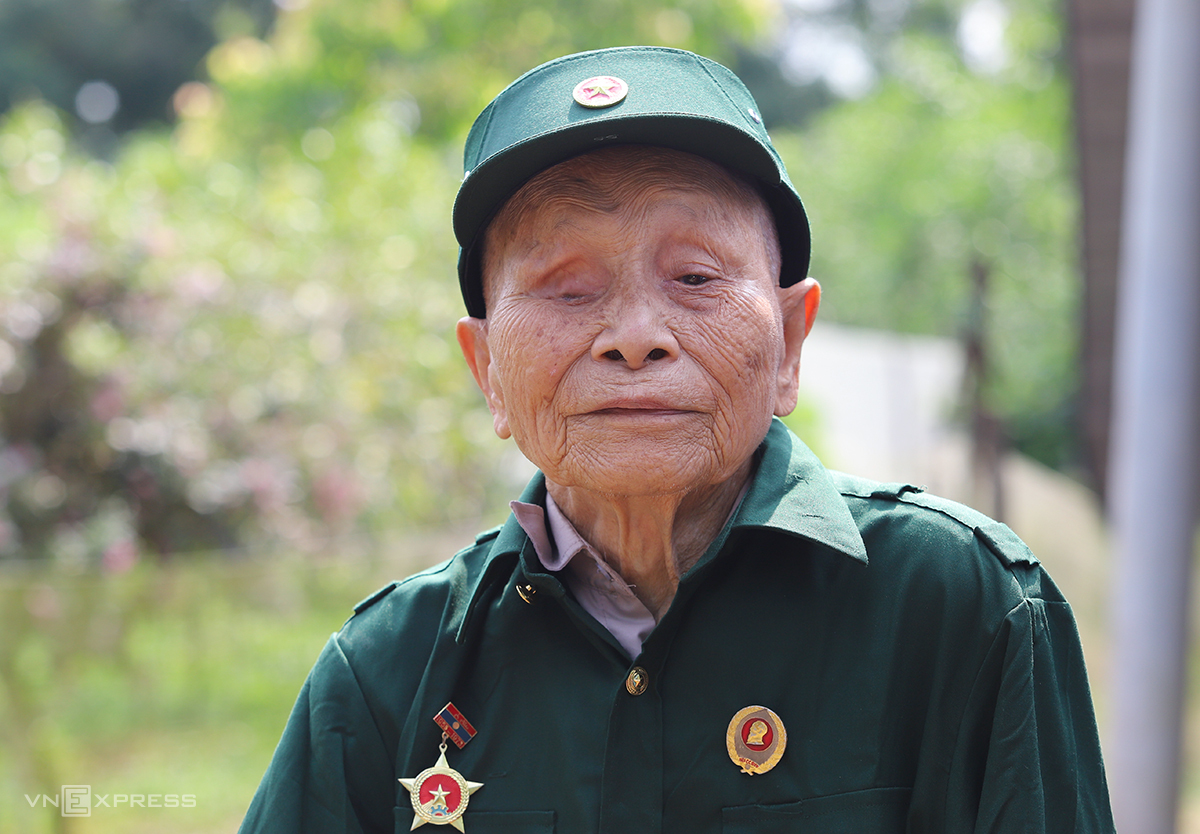
|
|
Veteran Tran Viet Van in Ha Tinh Province. Photo by Duc Hung |
Van and his wife have three children, all of whom live nearby but are financially constrained and unable to offer much support. Each month, the elderly couple receives a pension and social allowance totaling just over VND4 million (US$152.62), which barely covers medicine and daily essentials, leaving no funds for repairs.
For years, Van has watched his home deteriorate. In the summer, their house turns into a furnace, and winters are bitterly cold. He once saved more than VND10 million to reinforce the roof, but a relapse of old war injuries forced him to spend the money on medical treatment instead.
"I feel sorry for my wife. My heart aches whenever I see her huddle up during rainy days," Van said. On stormy days, he would call his children to stretch tarps and stuff bricks into the gaping holes. If the storms grew too fierce, the couple had to seek shelter at their children's homes.
Hong revealed that the family once discussed borrowing money to build a new house, but Van refused, insisting the funds should go toward his grandchildren's education. He even threatened, "I won't live in it."
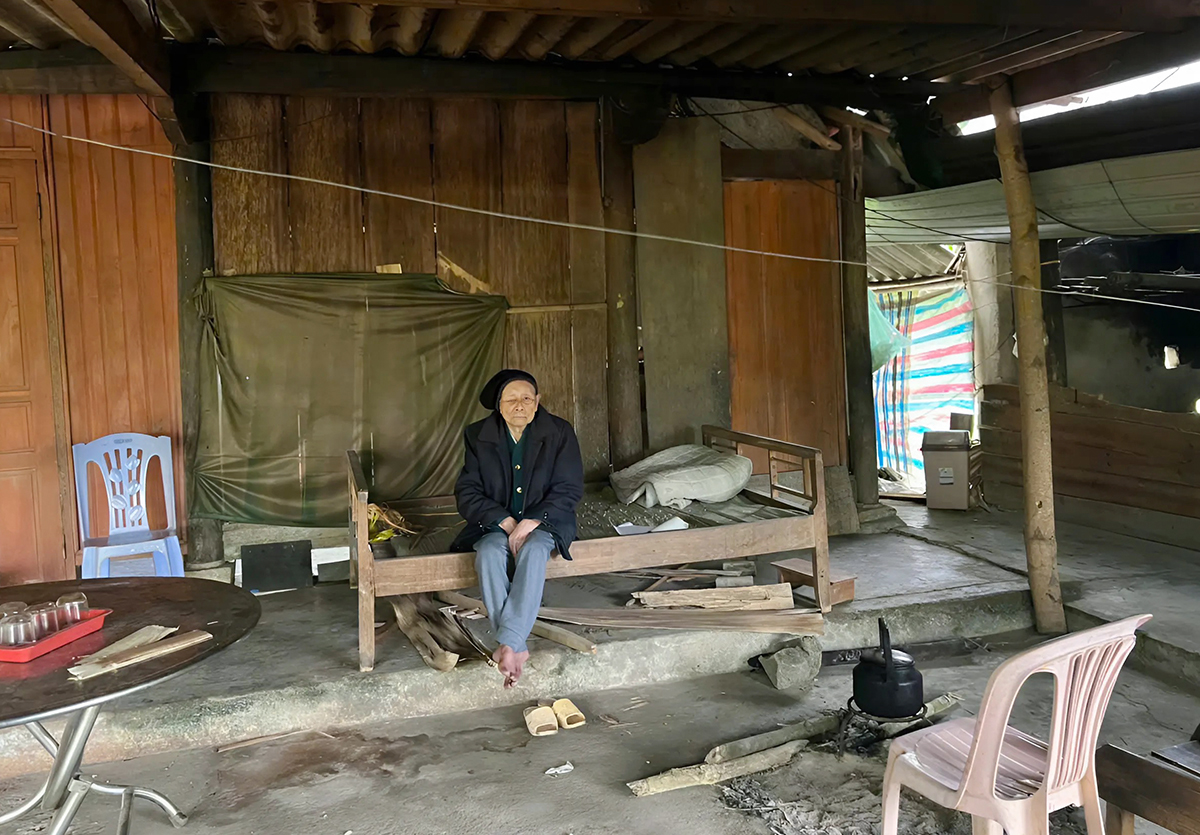
|
|
Tran Viet Van sits outside of his run-down home in Ha Tinh in early April 2025. Photo by Ngoc Anh |
"My parents-in-law always put their children and grandchildren first," Hong said. When the cold and damp weather sets in, she often stays overnight at their house, burning charcoal in an aluminum basin beside their bed. After a storm last year severely damaged the house, the family reinforced it with thick steel cables, which now make the house "look like a bunker," according to Hong.
As a young man, Van dreamed of building a sturdy one-story house that could withstand storms. Now nearing 100, that dream remains unfulfilled. Yet, the wounded veteran still considers himself lucky to have returned home and to be surrounded by children and grandchildren. "Many never made it back from the battlefield," he said. "I’m grateful just to be here."
Still, if he had one last wish, it would be for a proper house—not for himself, but for his frail wife. "If I pass away first, where will she live when this house finally gives way?" he said.
About 500 meters from Van’s home, a winding dirt road leads uphill to the modest home of Mai Hai Dang, 30. Perched halfway up a hill, the 60-square-meter mortar-walled house, built in 2010, now suffers from a leaking roof and cracked walls.
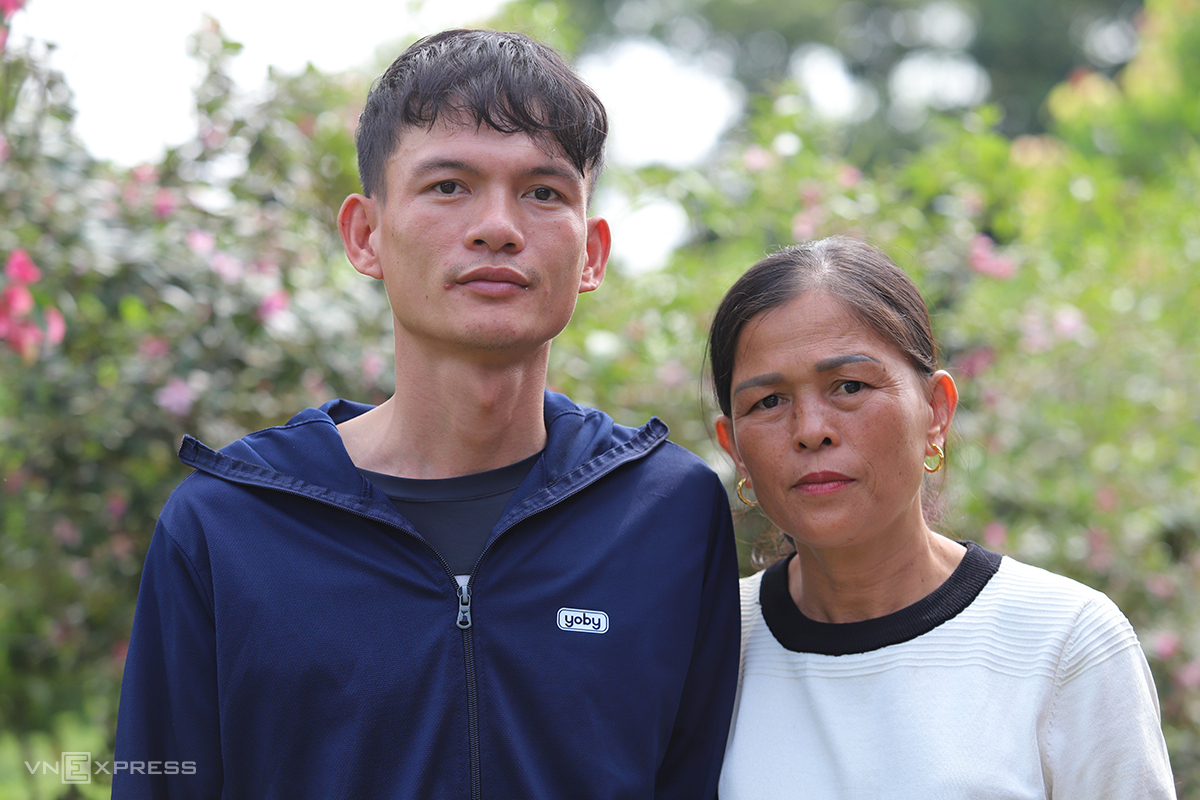
|
|
Mai Hai Dang (L) and his mother Phan Thi Hien. Photo by Duc Hung |
Dang's life has been as rough as the path to his door.
His mother, Phan Thi Hien, 60, recounted the struggles of raising a child with congenital deafness. The family borrowed money and traveled to multiple hospitals in search of treatment, but their efforts yielded no results. Eventually, Hien came to terms with her son's condition and taught herself sign language so she could communicate with him more fully.
Dang shared that by age five, he was fully aware of his condition and felt deep sadness. School became impossible; instead, he stayed home, helping his parents with odd jobs. Later, Dang attended a vocational training center for people with disabilities in Ha Tinh City, where he met Nguyen Thi Quynh, who shares his condition.
"Six years ago, he quietly slipped me a note that read, ‘I want to get married,’" Hien recalled. Shocked, she asked him what the other person was like. He signed, "She has the same condition as me."
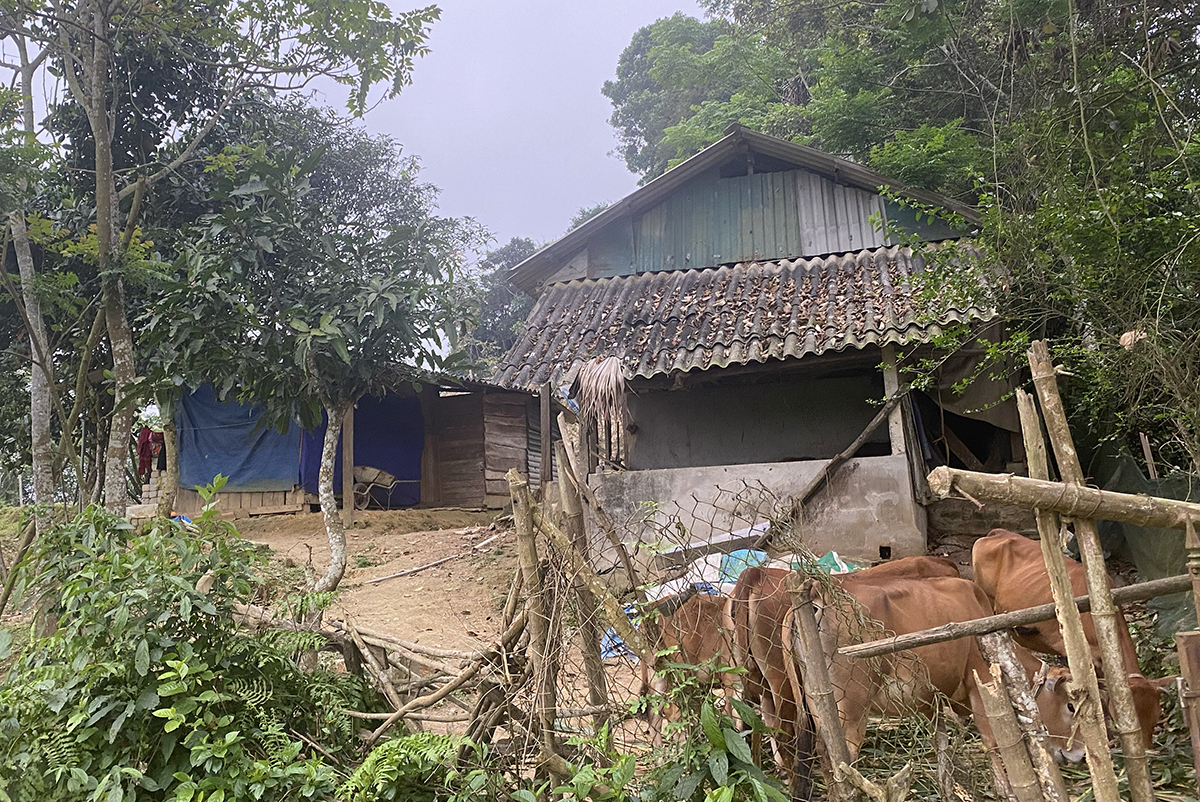
|
|
Mai Hai Dang’s home perched halfway up rugged hills in Ha Tinh. Photo by Ngoc Anh |
Despite concerns about their shared disability, Hien and her husband agreed to the marriage, hoping Dang would have a companion to share life’s burdens.
Three months later, the couple wed. In 2020, Quynh gave birth to a healthy baby girl. Hien said she held her breath for months, fearing her granddaughter might inherit her parents’ disability. But at 18 months old, the child called out, "mom and dad—grandpa and grandma," leaving the whole family in tears.
Today, Dang proudly signs to neighbors, "My daughter can talk."
Dang shared that his family motivates him to overcome adversity. Despite poor health, he picks up construction jobs when possible to pay for milk and his daughter’s kindergarten, covering basic costs. Yet, with a monthly income of just VND3–4 million, saving for house repairs remains out of reach.
Whenever it rains, Dang scrambles to catch the water dripping through the cracked roof with basins and buckets. Hien has thought many times of taking a bank loan to build a new house, but she fears falling ill and leaving her son with the heavy burden of debt.
Dang often tells his mother that he wants to save up to move the family away from the landslide-prone hill. Above all, he dreams of giving his four-year-old daughter a safe, sturdy home where she can grow up well.
Ha Van Dan, Chairman of the Fatherland Front Committee of Huong Khe District, said that Van and Dang's families have long been classified as poor households under policy support. Occasionally, local authorities provide them with small-scale assistance for farming or unsecured loans. However, they rarely receive support from associations or organizations.
"Regarding housing, for years they've lived in dilapidated, makeshift structures that are unsafe during storms. Their dream of a sturdy house to shield them from sun and rain is a constant longing, but one they never dared to make plans for due to their dire circumstances," Dan said.
To help Tran Viet Van's and Mai Hai Dang's families secure safe homes, Hope Foundation, in partnership with Agribank, is running the "House of Hope" program. Readers can contribute to the initiative to eliminate temporary houses and dilapidated houses for poor and disadvantaged households in Ha Tinh Province here .


